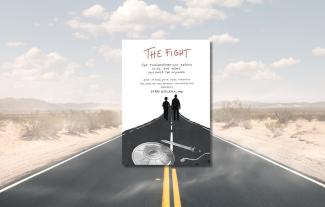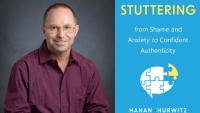Book review: The Fight

STAMMA volunteers Bill McMillan and Srishti Gopal share their thoughts on the new self-published book The Fight: How to find your inner strength for dealing with personal challenges and obstacles, by Ivan Kolega, MD.
Bill's review:
At the start of The Fight, by Croatian doctor Ivan Kolega, I took issue with the foreword, which is written by someone called Danijel Bursać, in which he states that 'Stuttering is a PROBLEM'. Not everyone would agree.
From there, Kolega relates his journey with stammering, which is well-written and includes a very good description of his childhood experiences, which I'm sure lots of people who stammer will relate to. At first he tried to hide it by speaking very fast so that he wouldn't stumble; I imagine it was kind of like a man running over rocky ground, mindful that he could trip at anytime.
He creates an imaginary friend, soon to be an enemy, who would fire arrows when he was speaking to make him block. This is where the 'fight' in the title comes in.
Kolega used typical strategies, which he calls his armour and shield, to go into battle with the day-to-day struggle of life with a stammer. Things like rapid speech, which got him past some of the arrows, but which fell apart after some unhelpful comments and actions by others. Kolega refers to this enemy using capitals like HE and HIM, which I found rather irritating, scattered indiscriminately throughout the book like detonated land mines.
Kolega then goes into personal theories, controversially stating how he thinks stammering is a learned behaviour which we acquire, which I didn't agree with.
Apart from the foreword and the controversial theories, I liked the actual story of the author's experiences, which I suggest most stammerers will recognise.
Srishti's review:
The title The Fight reflects Ivan's lifelong struggle with his stammer. Framing stammering primarily as an enemy to be defeated can potentially reinforce the 'medical model' of stammering being a problem. It's also language that creates an adversarial stance that can fuel exhaustion and perfectionism (he gets tired of fighting). I think it can also make 'acceptance' feel like surrender rather than growth.
However, Kolega realises this tension; he wants victory but later sees acceptance as key. As he gets older, he explains how, through a journey of discovery, the fight becomes less about defeating the stammer and more about understanding it, as he realises the stammer was always a friend, not an enemy. The 'fight' therefore represents not only his battle with speech but also his journey of misreading, resisting and finally accepting a part of himself.
Interestingly, there's a reference to the film Gladiator with the quote "Are you not entertained?", which opens up another angle: how much of Kolega's fight was for himself and how much was shaped by others? A great reflective question could be: Is he fighting the stammer or the shame imposed by society?
The 'fight' therefore represents not only his battle with speech but also his journey of misreading, resisting and finally accepting a part of himself.
A chapter titled Pilgrimage describes one step in his journey during his time at a religious commune, where he met addicts who helped him explore the theme of acceptance. Because of its use of religious imagery, some readers who might be sensitive about faith may find parts of the chapter challenging. However, Ivan doesn't mock or dismiss religion. Instead, he presents it sincerely, showing both how others relied on it for strength and how he himself tried to draw from it.
For me, the book succeeds in nailing the feelings surrounding stammering (shame, humiliation, brief triumphs), which can be life-changing for readers who might need validation. His tactics of coping and defending himself can provide useable practical strategies, grounded in real behaviour and speech therapy techniques (breathing, repetition, rehearsal). Kolega doesn't sell a single cure, but makes resilience feel plausible and human rather than a cheesy uplift.
In later sections, Kolega posits a theory that stammering is a learned behaviour, linked to conditioning, going against the evidence that it's neurologically-based. The book leans on metaphor and personal interpretation rather than clearly integrating scientific nuance; helpful for narrative but risky if readers take it as a definitive clinical model.
This perspective is provocative and potentially controversial. On the one hand it draws useful attention to the role of environment, pressure and fear in shaping speech patterns. On the other it suggests that if stammering is learned, then it can be unlearned. This risks oversimplifying stammering by underplaying its neurological and developmental basis, and might even feel dismissive and place responsibility on people who see their stammer as something they live with rather than something they have 'failed to adapt' to.
Ultimately, this section is less about presenting a scientifically validated theory and more about Ivan working through his own lived interpretation. Its controversy lies in this tension: it blurs the line between subjective experience and objective explanation, and so its value depends largely on whether readers take it as personal metaphor or universal claim.
Overall, rather than being a self-help book, The Fight is powerful when read as a memoir that prompts reflection, offers solidarity and encourages persistent, context-sensitive work toward resilience; not in delivering a single cure.
The Fight: How to find your inner strength for dealing with personal challenges and obstacles, is a self published book by Ivan Kolega, MD, available to buy on hardcover and paperback from Amazon.
Thank you to Bill and Srishti for reviewing this book for STAMMA.

































